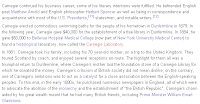
Mr. Carr describes several different experiments including scanning surfers' brains with MRIs and reading text only information vs. information with video, and the results are in: humans don't process information as well when we are not focused. I'm not really that surprised by the information presented in the article. As I stated in my first blog, the sheer volume and variety of information and resources required by the EIT and MPP classes makes it more difficult to process, relate to and store. I have a hard time remembering what I have finished and what I need to do because I have to access so many different resources...that in turn link to so many other resources...that in turn....
According to the article, psychologist Patricia Greenfield concluded that the benefits of the internet “go hand in hand with a weakening of our capacity for the kind of ‘deep processing’ that underpins ‘mindful knowledge acquisition, inductive analysis, critical thinking, imagination, and reflection.’” I find it interesting that the online version of this article contains hyperlinks in several paragraphs. The whole point is that those hyperlinks are making it more difficult to learn the information in the article.
A resource for those of you who also find the web distracting is Readability. It will filter all the ads…but not the hyperlinks. Just resist the temptation to click on the pretty blue words.
Picture of Andrew Carnegie Wikipedia page



I appreciate this post, for I have been feeling the same way about these classes. There is just so much information that I also have trouble remembering what I have done. This article makes me think of the revolutionary idea of multi-tasking: my principal tried to propose that we allow students to multi-task (example use cell phones while working in class) I think is not possible: students need to focus on one thing at a time. Your article seemed to suggest the same thing. Thank you for your insightful post.
ReplyDeleteThis is a great post and a fascinating article, Jennie! The good news is that our brains are adapting, the bad news is that we've become skimmers. We're going to need a toggle switch in our brains to flip between the deep and shallow modes on demand.
ReplyDeleteJennie, I wonder also after watching a video of hmmm-can't-remember-his-name..(wiring problem?) but he wrote a book about the digital natives, and he said these "millenials" can "multi-task".....Do they do ANY of the "tasks" well though??? Food for thought...you are a stitch!
ReplyDeleteSomewhere a long time ago (during college anyway) one of our reading assignments discussed how every time we learn something new, our brian becomes rewired in some way, shape or form. When I saw your post, it took me right back to that article (wish I could remember who the author or what the title of the artical was - obviously it rewired my brain in a negative manner.) When infomration gets processed by our brain, even the trivial stuff, it makes us think in a different way, or gives us a different pathway to think about things related and unrelated to that information. I'm sure that neuroscience has come a long way in twenty years, but it still makes sense to me even on a cursory level. Cool post.
ReplyDeleteI saw a movie on Netflix about a month ago entiled Frontline: Digital Nation and they were addressing this same issue i.e. multitasking and it's long term effect on our brains. I don't know about long term effects but I am certainly compelled to click on links in a narrative when I see them :)
ReplyDeleteMaybe disruptive thoughts is inevitable as a result of living in an evergrowing 'nearly now' society.